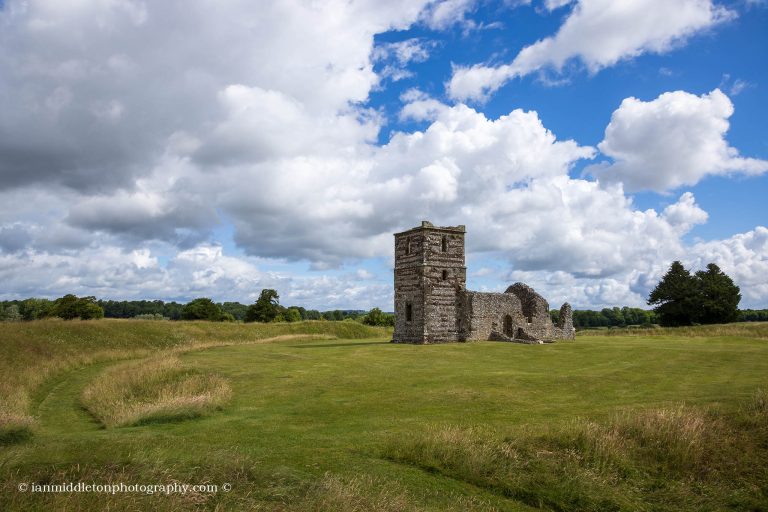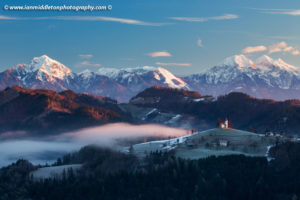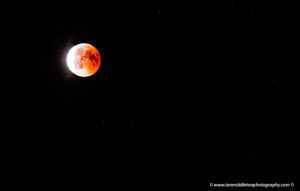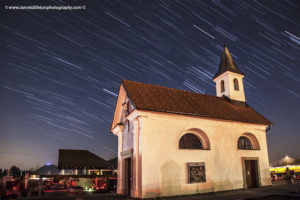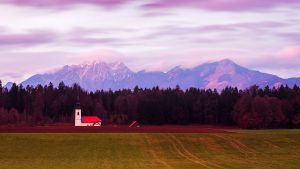The best photos are made in the worst weather
Joe Cornish
If you are not familiar with Joe Cornish, he is one of the masters when it comes to landscape photography, and can often be seen out in bad weather in his raincoat carrying an umbrella. He sums it up perfectly, though.
My wife often thinks I am mad heading out when the weather is bad, but it is a fact that some of the most amazing moments can happen during this time.
On a recent scouting trip around Dorset for my upcoming workshops, this was never so true.
Knowlton Church
The evening I arrived at my hotel in Poole North, the clouds were already beginning to gather. It was clear there would be no sunset colour, but the dramatic clouds would make a great backdrop to the lovely view of Knowlton Church and Earthworks, a bit further north of Poole. So I headed out there for the evening.
Knowlton Church is a captivating blend of ancient and medieval history. Nestled within a Neolithic henge, this ruined Norman church offers a unique glimpse into England’s past. Once a thriving place of worship, it now stands as a haunting yet beautiful testament to the passage of time. You can walk around this henge capturing several nice views of the ruins.
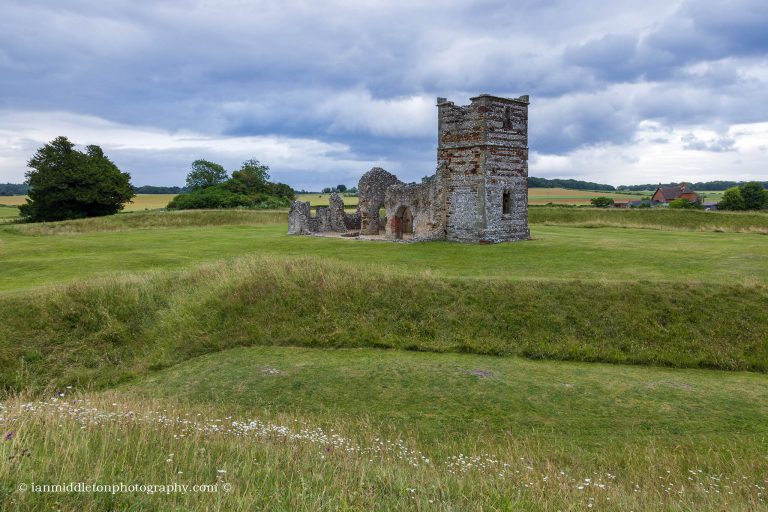
No sunrise or sunset the next day
The rain came later that evening and the forecast showed it staying through the night. I awoke at 3 and looked out the window, but it was clear that it would not stop so went back to sleep.
The next day the rain finally stopped and allowed me to get out and visit a couple of other great locations.
Horton Tower
Horton Tower (AKA Sturt’s Folly) is an 18th-century folly constructed by Humphrey Sturt, an influential local landowner and Member of Parliament. Designed to serve as a hunting lodge and observatory, the tower stands at an impressive height of 140 feet, offering panoramic views of the surrounding countryside. Its Gothic Revival architecture, featuring battlements and pointed arch windows, makes it a striking landmark in the rural landscape. Despite its original grandeur, the tower fell into disrepair over the centuries but remains an intriguing historical structure and a testament to the eccentric architectural tastes of its era.
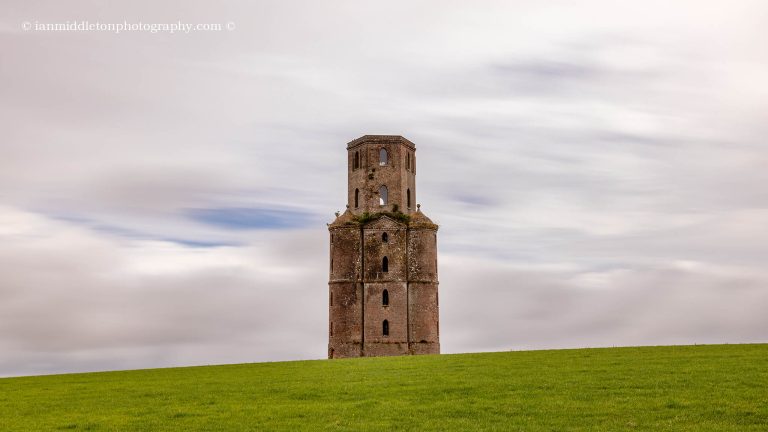
In 1991 Vodafone secured permission to use the tower as a mobile phone mast, a partnership that saw the tower’s restoration and subsequent recognition with a prestigious planning award. Today, the tower remains home to the transmitters, and is regularly upgraded.
Thanks to the brilliant Photohound website and app, I was able to find the best spot to park and walk out to a nice viewpoint of the tower. The clouds were moving and breaking a bit, so I found a nice straight on view and put on my Kase KW Revolution 3 & 6 stop ND filters to get a 20-second exposure.
Tree-lined road at Moor Crichel
The lovely tree-lined road leading into the village of Moor Crichel is a quintessential English scene. This picturesque avenue is lined with majestic beech trees, creates a sense of tranquility and evokes images of timeless rural charm.
Ordinarily this would be best photographed in the morning or evening, with soft sunlight filtering through the trees. However, I arrived in the middle of the day but the bright overcast sky softened and diffused the light, and the yellow of the barley fields helped to add more colour. In summer of course, the trees are lovely and green too. There are several viewpoints and compositions available here, but for my visit I chose to capture the long straight road as you first enter the avenue.
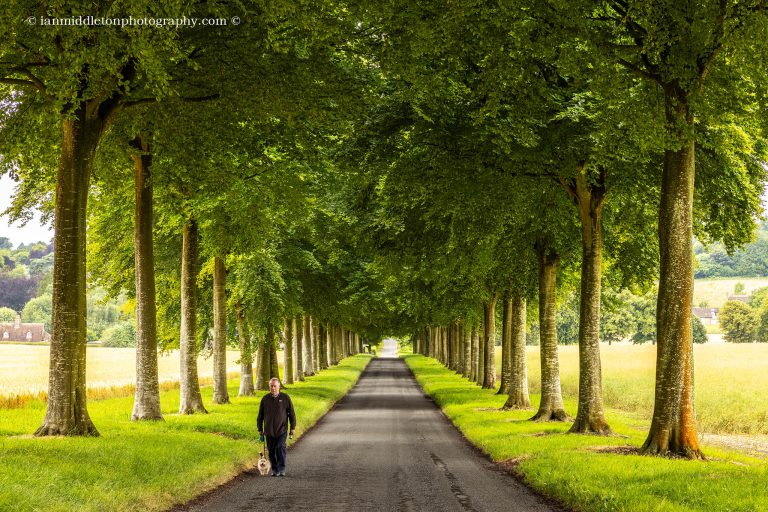
It’s important to be careful here, as this sort of shot requires you to setup in the middle of the road. Thankfully, as it’s a country road, it is not too busy. That being said, I was standing on the start of a downward slope only a very short distance from the brow of the hill. Therefore, an approaching car from behind became visible very close to me, so I had to be alert and move away quickly.
It can be difficult lining up the shot too, as you need to get everything centralised, so it took me a while to plan and organise these shots. Thankfully though, in that time this local fella and his dog came walking up the road and provided the perfect addition to my shot. I managed to capture him in several positions from further away to up close.
I showed him the photo, and he was quite pleased with it.
Beech Avenue at Kingston Lacy
The Kingston Lacy Beech Avenue is a breathtaking spectacle.
Again, this is best photographed in autumn or spring as the colours are turning. But I was here to scout it. Getting the iconic shot from the middle of the road though, is far more dangerous here. The avenue lies of the B3082, Blandford road. This is a very busy road between Wimborne and Blandford Forum and cars are whizzing by at high speeds. Thankfully though, the National Trust has provided a safe walking path alongside the road where you can walk down and get a nice variety of shots.
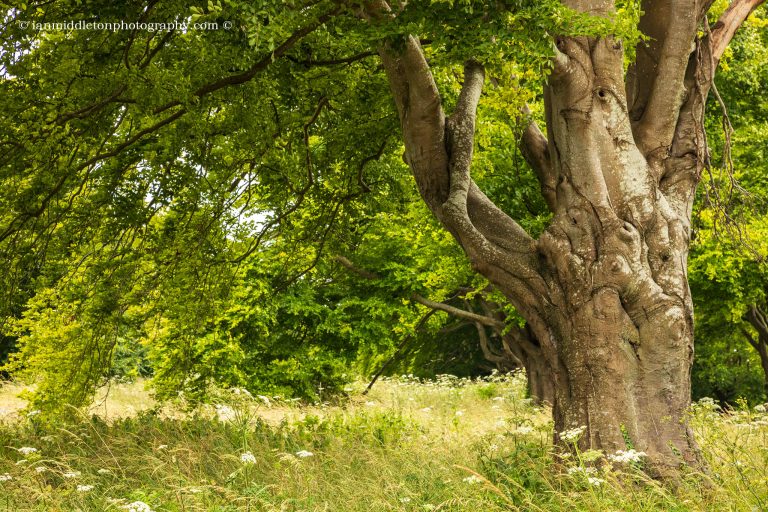
I parked at the turn off to Badbury Rings, where you can also drive up a short gravel road to the National Trust paid car park and visit the rings. This is a huge Iron Age hill fort that was actively in use up to and beyond the Roman occupation. Legend says this is the location of King Arthur’s last battle, where he was turned into a raven by witches.
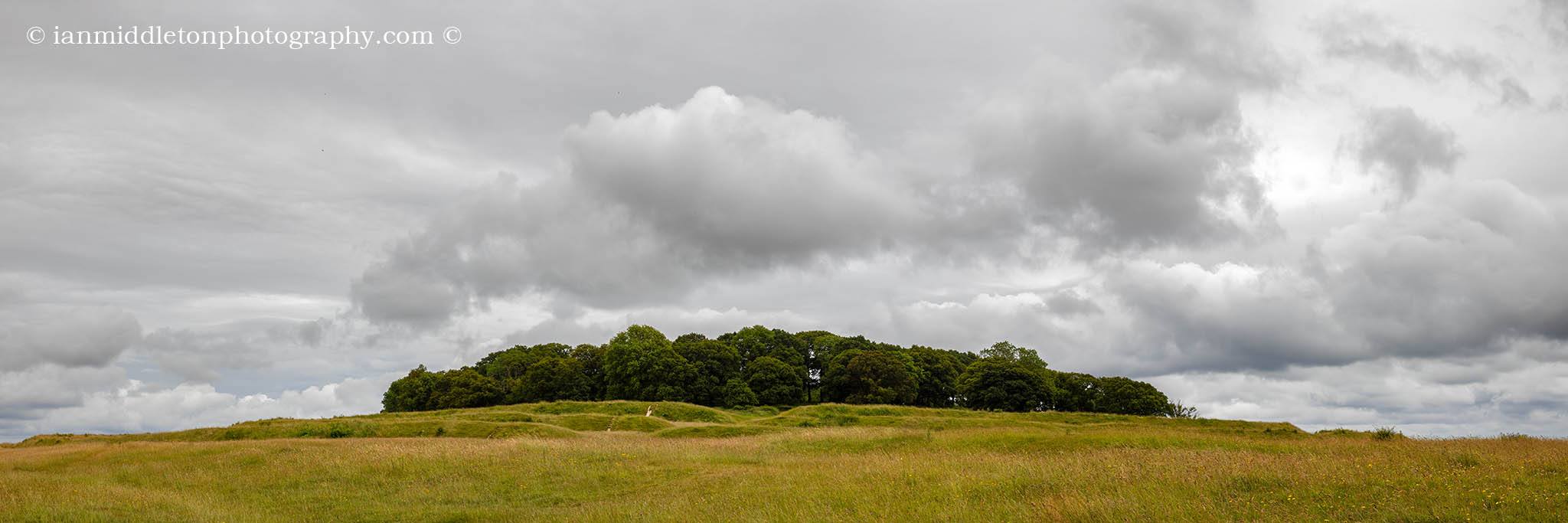
Swanage Old Pier & Old Harry Rocks at Sunrise
After I left Kingston Lacy, the rain returned for the rest of the day, so sunset was also out.
However, the next morning looked more promising as the forecast showed the heavy rain overnight clearing around sunrise; albeit with one more short storm forecast to move over Swanage shortly after sunrise. While bad weather often brings great moments, you do need to make an informed decision as to whether the chances of getting something are worth the risk of heading out in bad weather. The previous morning it had been clear the chances were zero. This morning though, the conditions looked just right for some potential light-breaking moments. Heeding the storm warning though, I made sure to bring my raincoat and umbrella.
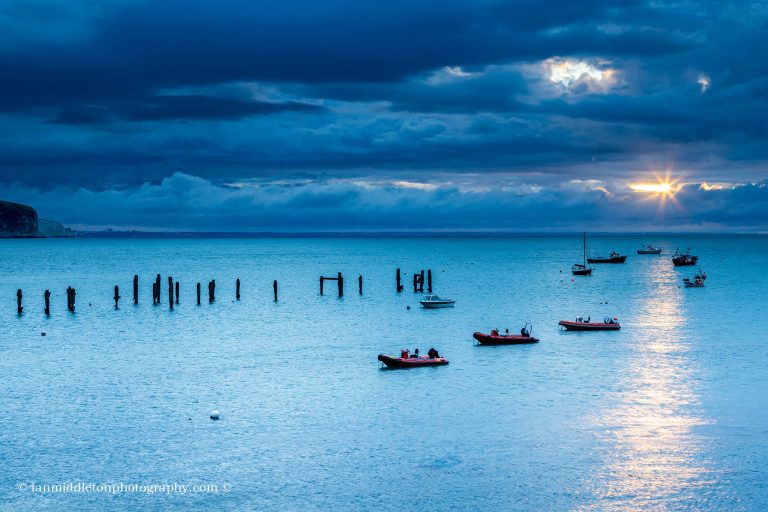
Ordinarily summer is not the best time to photograph the Dorset coast because the sun mostly rises and sets to the north further inland. However, Swanage is an exception, as it’s orientated towards the east. I found this viewpoint last year in April when the guy at the entrance to the new pier told me about it. Once there, I worked out that in summer the sun would rise fairly close to Old Harry Rocks. So I had made it my mission to return this summer.
When I arrived, there was still some thick cloud over the horizon. I worked out where the sun would rise by using the peak finder app, which I have found to be the most accurate when on location.
Clouds obscured the sun as it rose over the horizon, but then a little later they parted and the sun burst through a crack, giving me a fantastic sun star amid a very dramatic stormy sky!
The storm arrives
After that, the predicted storm blew right over where I was standing. I had to throw my raincoat over my camera bag to protect my gear from the torrent that fell (myself and the camera huddling under an umbrella fighting with the wind). But the clouds and colour that came with it, also brought some great images! I was absolutely blown away by the beautiful mix of moody clouds and the blue of the clearer section on the horizon as the storm clouds moved over me towards the east. As I stood there under my umbrella clicking away, I thought of Joe’s words. How right he is.
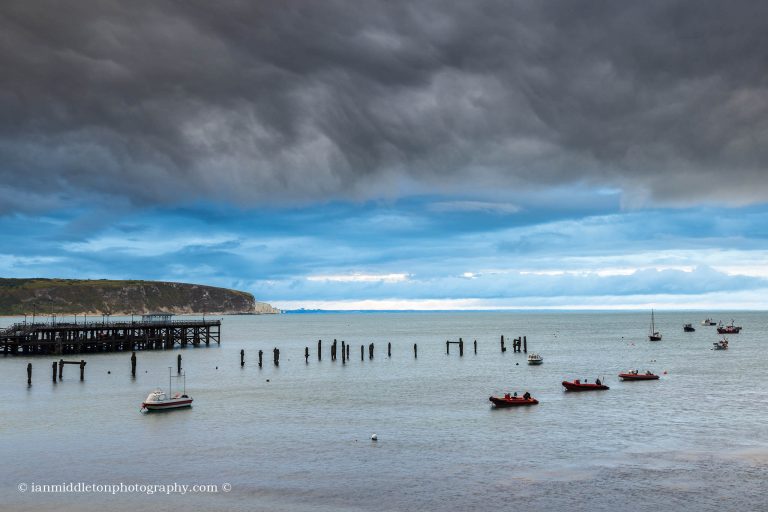
Angel Rays over the Isle of Wight
As the storm moved away and the sun got higher I turned to see this amazing scene as the sunlight broke through and cast three bands of light over the Isle of Wight cliffs, which are visible from this part of the Jurassic Coast. You can just about make out the Needles on the lower left breaking through.
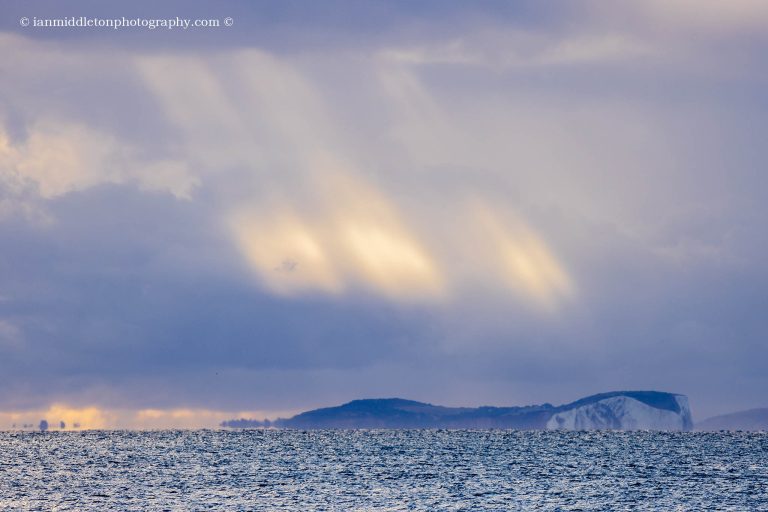
Crashing waves at Portland Bill
After breakfast, I headed off to Portland Bill to run my one-day workshop. The storm clouds had abated and as forecast there was just some light scattered cloud for the rest of the day. Perfect conditions. The storm had left behind a day of ferocious winds, which were battering the Portland Bill promontory from the west. While these winds were throwing up some lovely high waves, it also presented a problem with spray and safety.
We spent the first part on the eastern side which was bit more sheltered and took advantage of the early afternoon light fall on that side of the peninsula.
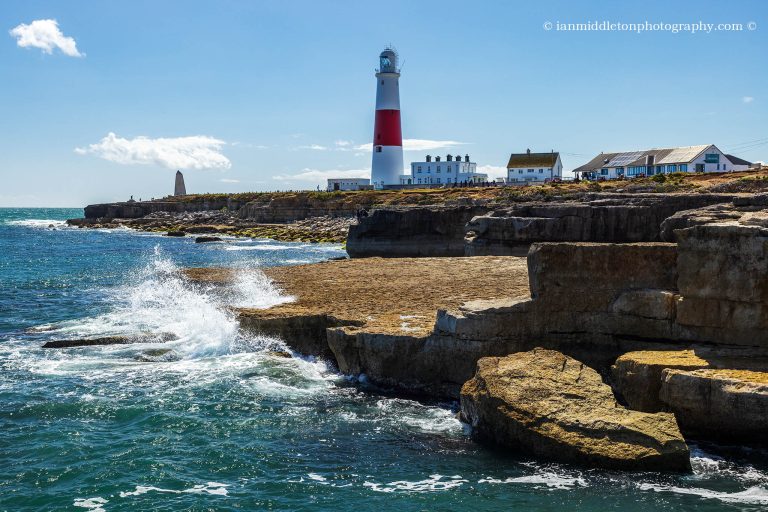
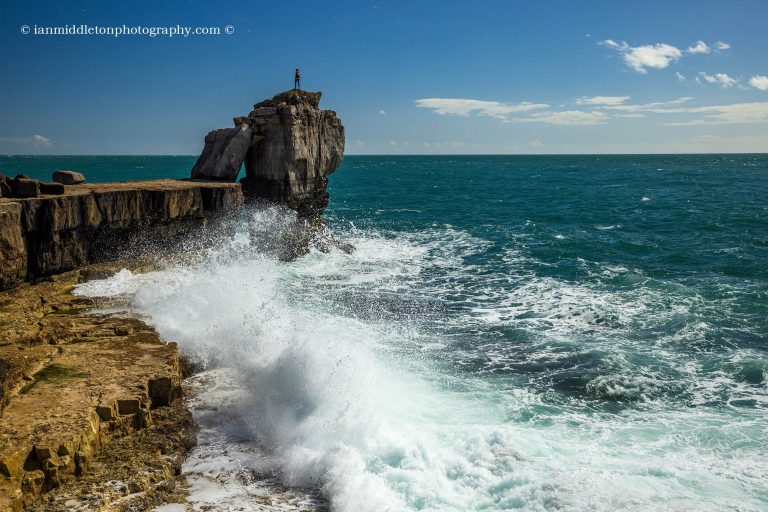
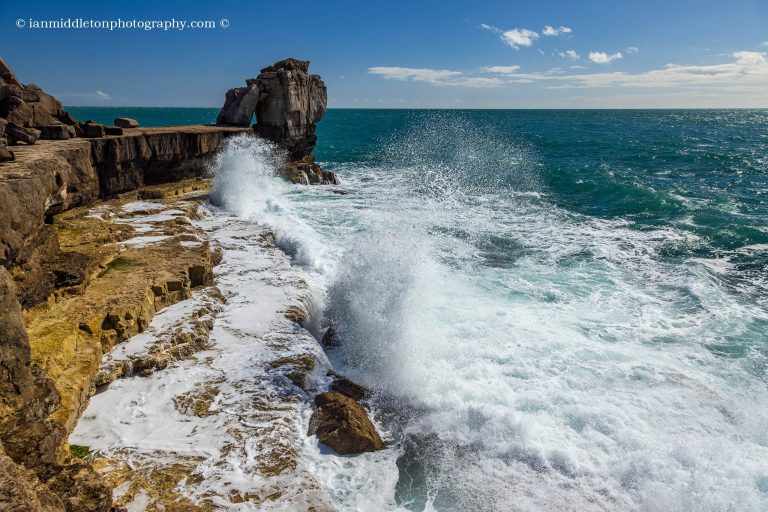
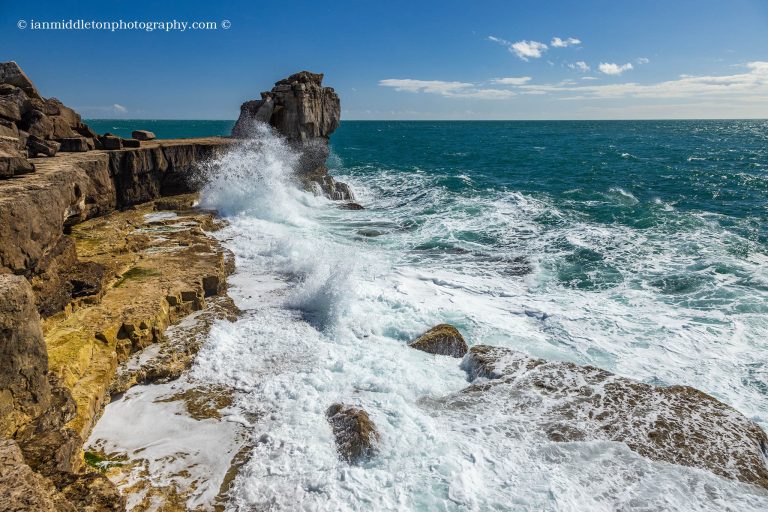
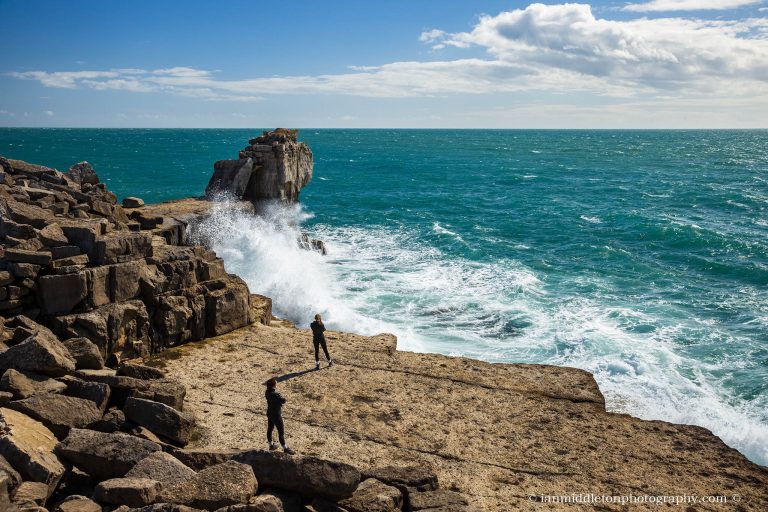
Sunset from a more sheltered viewpoint.
We took a well-deserved break in the Lobster Pot Cafe and enjoyed some Dorset cream tea and scones.
When we headed back out the winds were just as ferocious and seemed to show no sign of easing, so we took a walk around and found a nice sheltered spot to shoot the sunset from.
The Trinity Obelisk is a triangular pillar of white Portland stone. The obelisk was built in 1844 at the Southern tip of Portland Bill as a warning of a low shelf of rock extending 30 metres south into the sea.
We used this as a shelter from the relentless winds and sea spray to safely photograph the waves crashing against the rock at sunset.
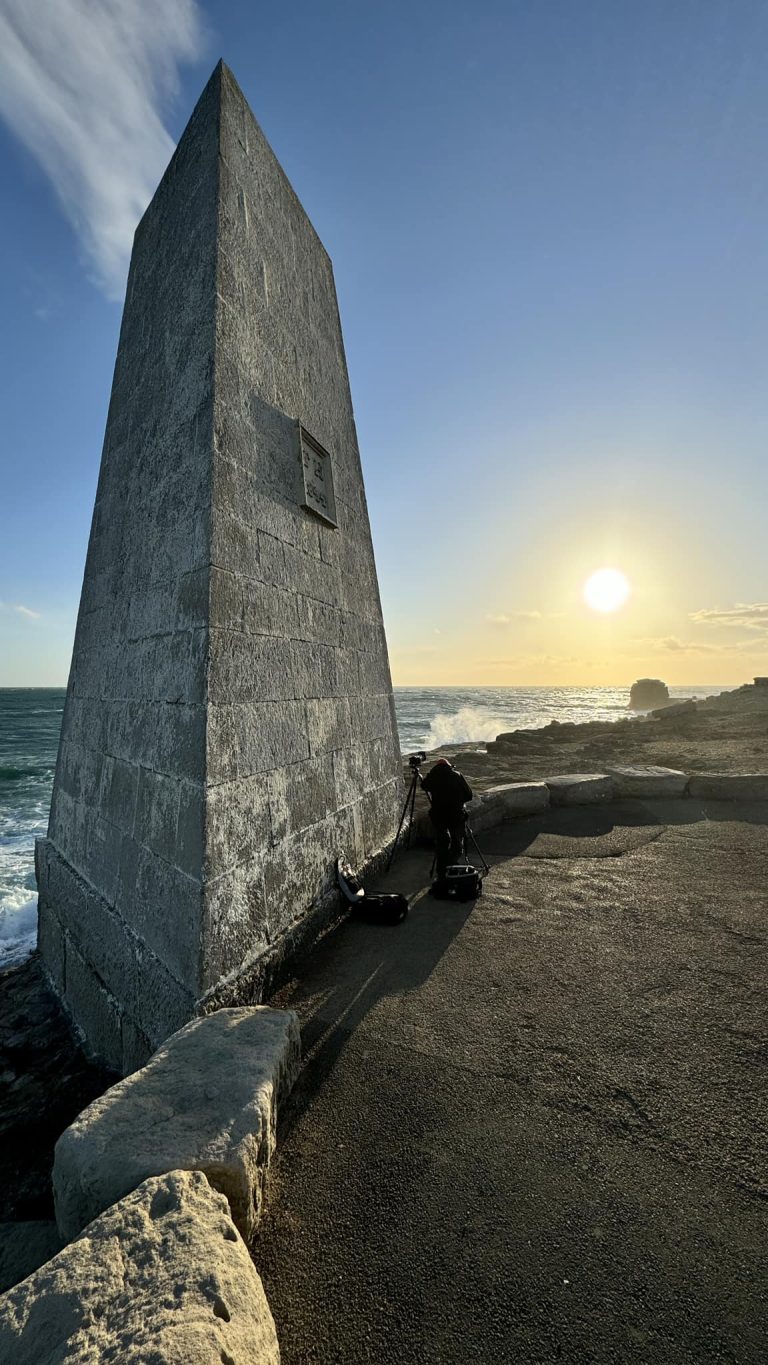
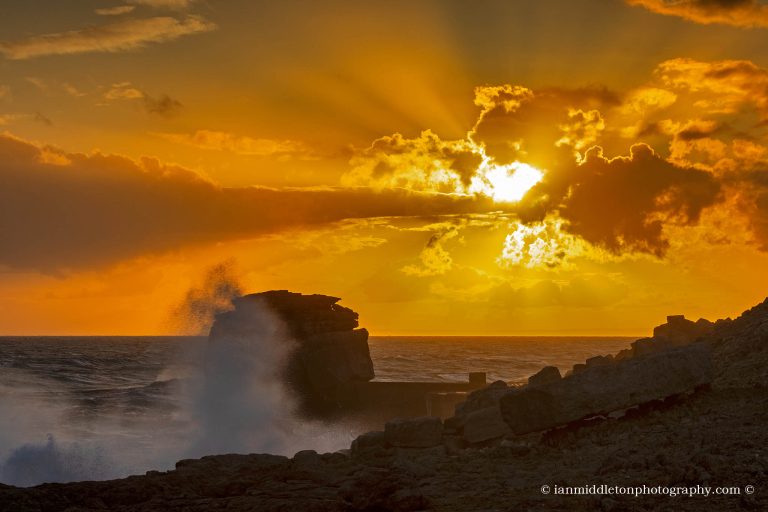
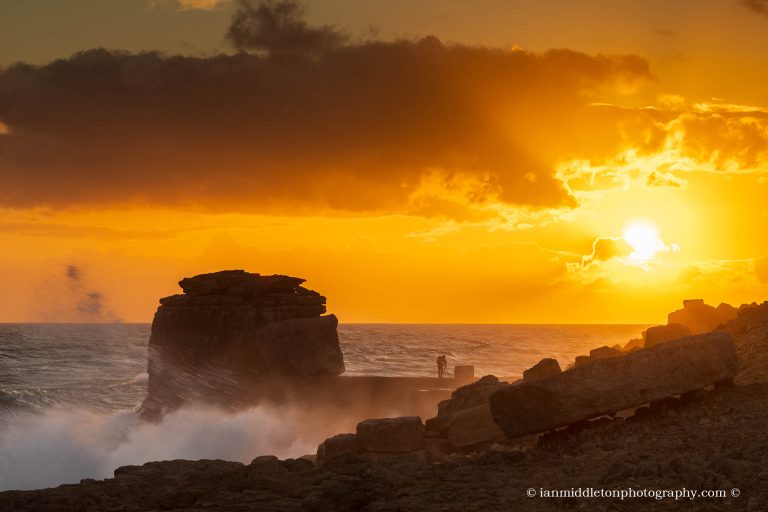
Better weather on my last morning
The forecast for the next morning was also bad, and as I was due to take a late flight that day to Venice, where I would arrive at my hotel around 1 or 2am (which in fact turned out to be 4 after a delayed flight. More about that in my next newsletter), I decided not to get up for sunrise. Still, when I checked out of my hotel, the bad weather was clearing so I shot up to Knowlton Church for one last morning shoot before heading off. Here I got some lovely shots as the clouds broke over the church and sunlight flooded through.
